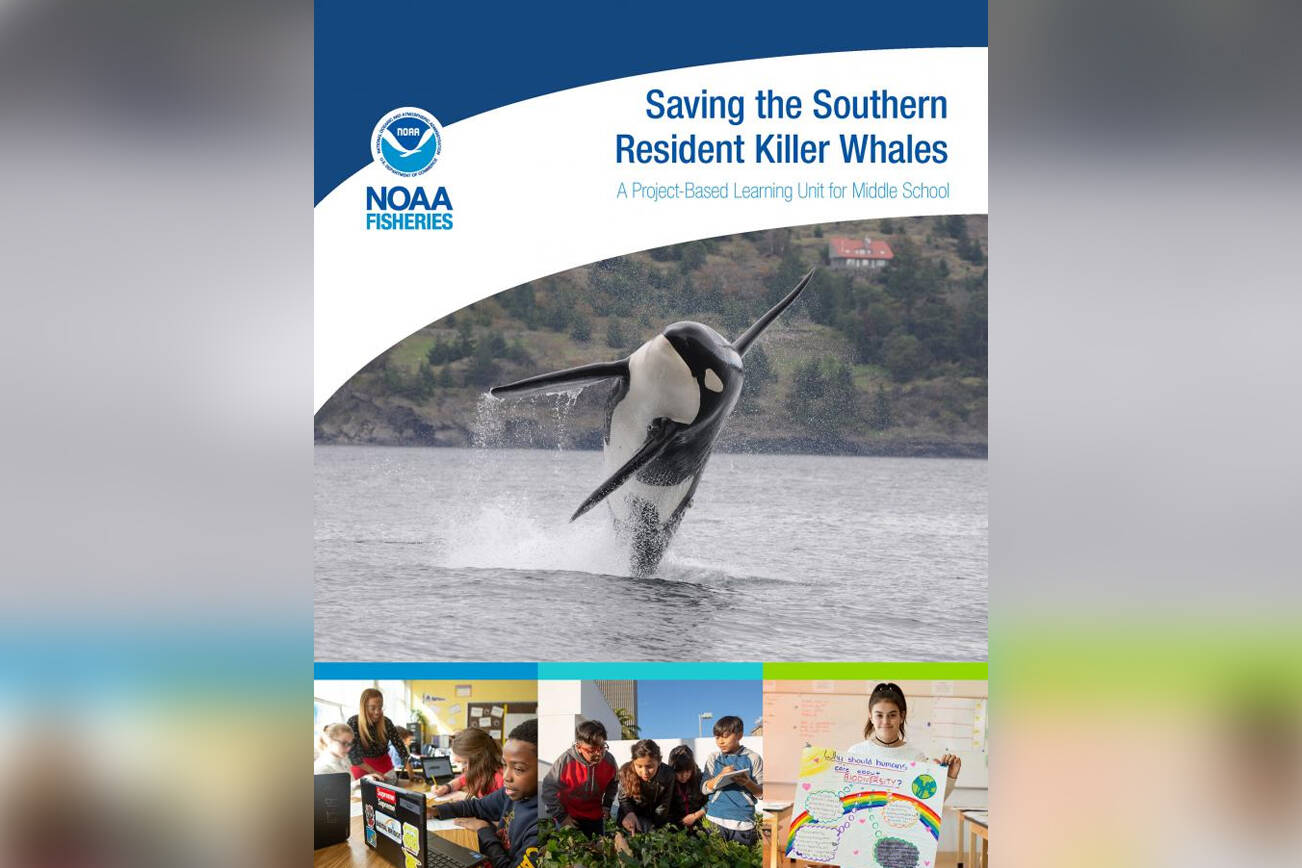Originally published by NOAA West Coast Fisheries.
Endangered Southern resident killer whales may be coming to a classroom near you. These majestic animals are often seen as sentinel species that reflect the health of the environment. Now a new curriculum seeks to inspire young people to become environmental stewards and join efforts to recover imperiled species such as the Southern residents.
NOAA Fisheries West Coast Region has designed the new curriculum, Saving the Southern Residents, for middle schoolers. Throughout the unit, students collaborate to answer the question: How can we make a meaningful difference for the critically endangered Southern resident killer whales?
This multi-part curriculum is free and focused on educators and students on the West Coast, but the curriculum is available to anyone with interest and access to the materials online. It not only presents information on the Southern Residents and their status, but also gives students the opportunity to think about ways they can help in their own classroom and community.
This curriculum employs a unique teaching approach, called project-based learning. This is an evidence-based tool that can advance student achievement and empower student-led action. Rather than passively learning, project-based learning empowers students to coach, facilitate, and learn together. Research has shown that students learn best when they experience and solve real-world problems. Southern Resident killer whale conservation and recovery are natural topics and let students tackle challenges collaboratively.
“This unit gives students not just the important information on the endangered state of Southern resident killer whales, but teaches them how to collectively tackle some of the biggest challenges facing our world today,” NOAA Fisheries West Coast Region’s Education and Outreach Coordinator Alicia Keefe said.
“Project-based learning can be applied to a multitude of real-world issues that we need to enlist our younger generation to help solve,” Keefe said.
This standards-based unit helps students understand:
• Cultural, economic, and ecological importance of Southern Residents
• Connections between individual actions and watershed health
• Limitations and benefits to different types of action
• Unique power of youth voice and passion for driving change
The unit contains nine fully-planned activities that can be used alone or as a complete series. Activities can be scaled to different timelines and students’ interests. The unit provides many opportunities for students to create public products and share beyond the classroom. The final activity supports a student-led stewardship project that embraces students’ talents and interests.
Interdisciplinary and inclusive
The unit challenges middle school students to apply connections across different subject areas, making the material more relevant and meaningful. This unit steers students in the cultural, environmental, and economic importance of Southern Residents. They can discover how their own actions can support the conservation and recovery of these critically endangered whales.
Southern residents are culturally and spiritually important to the Salish Sea and beyond. They are featured prominently in the stories, songs, dances, art, and ceremonies of the Coast Salish people. Some tribes believe the Southern Residents to be their ancestors. For example, the Lummi name for killer whale, Qwe ‘lhol mechen, roughly means “our relations under the sea.”
“This unit teaches not only about the Southern Residents,” said Amilee Wilson, Tribal Coordinator for NOAA Fisheries West Coast Region, “but how important the Southern Resident killer whales have been to local native cultures, appearing in creation stories that have been handed down for generations.”
To help reach as many students as possible, this unit:
• Uses a font, OpenDyslexic, that helps with some common symptoms of dyslexia
• Includes a Google Classroom companion to support online and hybrid remote learning
• Will be translated to Spanish later this fall
All hands on deck
Every day we make choices that affect the Southern Residents, their prey, and their habitat. The recovery of these iconic whales depends on government, industry, and community partnerships and active, informed individuals, including our youth! It will take all of us working together to save the orcas.
While students are not responsible for the state of the Southern Residents, they can be a real force for change — especially when they work together. The curriculum helps students understand the limitations of individual action and the benefits of collective action, governmental regulations, and social norms — and how to make a difference.
For questions or comments about this unit, please reach out to Alicia Keefe at alicia.keefe@noaa.gov.




